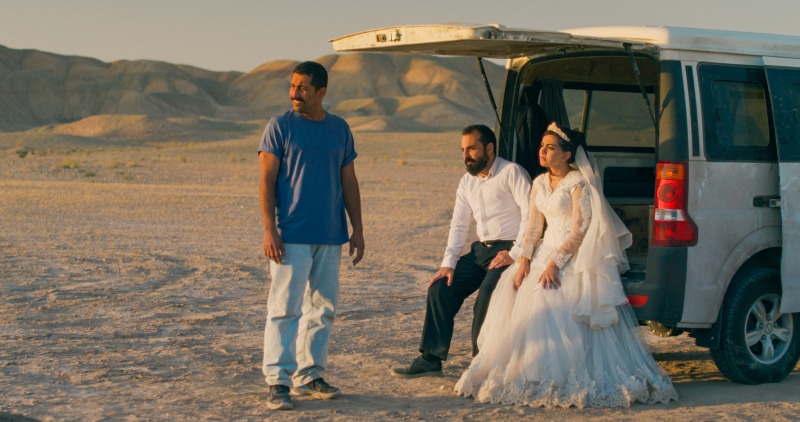
Festival de Cannes
MOVIE REVIEW
It Was Just an Accident (2025)
By the time its Cannes Film Festival world premiere was over, it was clear Jafar Panahi’s “It Was Just an Accident” had emerged as the frontrunner for Palme d’or four days before the closing ceremony. Its reception distinctly set it apart from worthy competition in an overall strong slate. It’s a triumphal return of sorts, his first drama since 2010 when Iran barred him from filmmaking and traveling for two decades. Though Mr. Panahi continued to work in secrecy and have his projects smuggled abroad, following 2006’s “Offside” until now he only made docudramas, injecting himself into the narratives.
“It Was Just an Accident” begins as a family drives down an unlit road at night. Nilfur (Delmaz Najafi), the little girl in the backseat, joyfully jams to the loud music and plays with her hand puppet, evoking the naïf verve of Mr. Panahi’s early works. A loud thud and a whimper, seemingly of a dog, suddenly kill the mood. Eghbal (Ebrahim Azizi) stops the car to inspect the damage. Though the film never explicitly shows what happens here, we get the idea.
The vehicle soon breaks down. A full-range garage is apparently some distance away, so Eghbal enlists help at a nearby shop. While his colleague works on the car, Vahid (Vahid Mobasseri) is hiding upstairs and spying on the unexpected guests. When the family drives away, Vahid begins tailing them. He spends the night outside their apartment building and continues following when their car is towed the next morning by a proper mechanic shop. While Eghbal waits for his car to be serviced, Vahid intentionally hits him with his van and kidnaps him.
Vahid is triggered by the clicking of Eghbal’s artificial leg, which he is convinced is that of the sadistic guard who tortured him while he was a blindfolded political prisoner. Before burying Eghbal alive in the desert, Vahid pauses and stops by a bookshop to ask Salar (Georges Hashemzadeh) to help verify that Eghbal is indeed the monster they called “the gimp.” Salar sends him to Shiva (Maryam Afshari), a photographer in the midst of taking wedding portraits. She’s seemingly moved on from their shared suffering and wants nothing to do with this until Vahid finally coaxes her to meet Eghbal.
With the bride-and-groom-to-be (Hadis Pakbaten and Majid Panahi) now tagging along, they pick up yet another ex-prisoner, hothead Hamid (Mohamad Ali Elyasmehr), knowing full well that he’ll go berserk. Together, they attempt to coerce a confession out of Eghbal, who insists they’ve got the wrong guy.
It’s not surprising that something this blistering was born out of Mr. Panahi’s own imprisonment. What’s unexpected is that he, along with his contemporary Mohammad Rasoulof (last year’s Cannes competition title “The Seed of the Sacred Fig”), are now able to make such searing indictments of the oppressive regime and still get to travel. Mr. Panahi lingered quite a bit on the red carpet leading to the Grand théâtre Lumière and seemed to bask in the post-screening standing O.
As with “A Separation” and “Woman and Child,” its fellow Cannes entry from Iran this year, the ever-escalating series of events in “It Was Just an Accident” makes a potent thriller. And like “Sacred Fig,” the anguished political context makes the film an indispensable morality tale about the psychological toll of living under authoritarian rule. It’s especially timely to us in the West, as our political climates grow more tenuous.
The cast and crew are excellent across the board. Mr. Mobasseri, Ms. Pakbaten and Mr. Elyasmehr are especially commendable for not holding back in their scorched-earth performances, given the risks inherent in their association with a not officially sanctioned production such as this.
“It Was Just an Accident” and “Sacred Fig” signal that things are changing for the better in Iran, that a sober appraisal of current affairs won’t be suppressed, or at least that these harsh sentences imposed on its artists are no longer being enforced. As a writer-director, Mr. Panahi has never been better. One just wishes he didn’t have to be subjected to what he went through to arrive at this career pinnacle. The film ultimately ends on an ambiguous note. Perhaps he himself is still unsure of its potential fallout in Iran, even as the country’s excellent cinema is having its moment on the world stage.
Comments